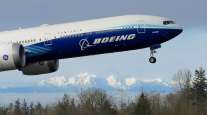Boeing to Take $4.9 Billion Charge Over Grounded 737 Max Jet

[Stay on top of transportation news: Get TTNews in your inbox.]
Boeing is booking a $4.9 billion charge to cover possible compensation to airlines that have canceled thousands of flights since the 737 Max jet was grounded after two deadly accidents, the aircraft manufacturer said July 18.
The Max-related fallout will cut $5.6 billion from its revenue and pre-tax earnings in the April-through-June quarter, Boeing said.
The Chicago-based company said the calculations were based on an assumption that regulatory approval for the plane’s return to flying will begin early in the fourth quarter.
That timing is earlier than some analysts expected and may have contributed to a rally in Boeing shares in after-hours trading. Boeing is scheduled to report its quarterly results next week.
The company also raised its estimate of Max production costs by $1.7 billion because output will be curtailed longer than expected.
Boeing still is working on fixing flight-control software that appeared to play a role in crashes that killed 346 people off the coast of Indonesia and in Ethiopia. In March, regulators grounded the Boeing 737 Max and the company suspended deliveries of new jets.
Paul Njoroge lost his wife, three children and mother-in-law when a Boeing 737 MAX crashed in Ethiopia in March. Wednesday, he's testified in Congress https://t.co/CBLs7Zgl7u via @ReutersTV pic.twitter.com/dKr8FUBDg1 — Reuters Top News (@Reuters) July 17, 2019
The $4.9 billion charge does not include amounts that Boeing may pay in the dozens of lawsuits filed by families of crash victims. Boeing this week hired a victims-compensation expert to oversee a $50 million relief fund for families, which the company said was separate from the lawsuits.
The $5.6 billion hit to pre-tax earnings is more than half of Boeing’s $10.5 billion profit for all of 2018.
“The Max grounding presents significant headwinds, and the financial impact recognized this quarter reflects the current challenges and helps to address future financial risks,” Chairman and CEO Dennis Muilenburg said in a statement.
CFRA Research analyst Jim Corridore said putting a figure on airline compensation and the potential return of the plane in the fourth quarter provided important clarity around the damage inflicted by the grounding.
“We expected a large charge, and this is in the order of magnitude we were expecting,” he said. “In general, we are happy to have some details.”
RELEASE: Boeing to recognize charge and increased costs in second quarter due to 737 MAX grounding.
Read more: https://t.co/ooDa5KBzec — The Boeing Company (@Boeing) July 18, 2019
The plane’s return has been pushed back several times, most recently after Federal Aviation Administration pilots found a new flaw while testing Boeing software changes in a flight simulator.
That discovery prompted Boeing to say in late June that it expected to present its proposed fix to FAA “in the September timeframe.” It likely would take several more weeks for FAA and other regulators to approve Boeing’s work, give pilots additional training and bring long-parked jets up to flying condition.
Boeing says concessions to airlines will be spread over several years, but it is taking the entire estimated expense as a charge in the second quarter. Boeing did not specify what form the compensation would take, but hinted that it would not be entirely in cash.
Despite the grounding, Boeing has kept building Max jets, although at a reduced rate of 42 per month, down from 52, since April. The company said July 18 that it assumed it gradually can raise production to 57 per month in 2020.
Boeing has delivered fewer than 400 Max planes but has unfilled orders for about 4,500.
Shares of Boeing Co. rose $7.54, or 2.1%, to $368.65 during after-hours trading. Before the announcement, they fell $8.41 to end regular trading at $361.11.




